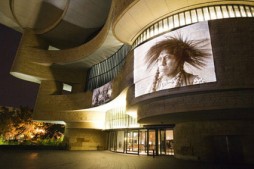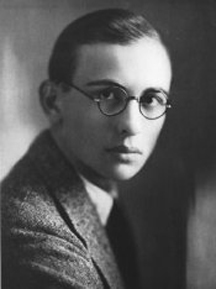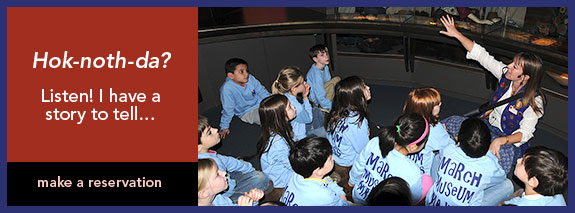Food, film, music and more at the American Indian Museum
The Smithsonian’s National Museum of the American Indian will host a variety of free public programs to celebrate American Indian and Alaska Native Heritage Month in November, including dance, theatrical performances, art demonstrations, films and more. The theme is “Promoting Healthy Families, Cultures and the Environment.”
 To kick off Heritage Month, the museum presents “Family Celebration Harvest Festival” Saturday, Nov. 6, and Sunday, Nov. 7, between 10:30 a.m. and 4:30 p.m., in the Potomac Atrium. Featuring two days of food demonstrations, theater performances and hands-on crafts, the festival explores how Native communities throughout the Americas celebrate the harvest season. Free activities include weaving cornhusks, creating masa (a corn meal dough used in indigenous cooking) and making tamales. The local Mayan community also will create a special puppetry presentation based on the Popul Vuh, a Mesoamerican creation myth.
To kick off Heritage Month, the museum presents “Family Celebration Harvest Festival” Saturday, Nov. 6, and Sunday, Nov. 7, between 10:30 a.m. and 4:30 p.m., in the Potomac Atrium. Featuring two days of food demonstrations, theater performances and hands-on crafts, the festival explores how Native communities throughout the Americas celebrate the harvest season. Free activities include weaving cornhusks, creating masa (a corn meal dough used in indigenous cooking) and making tamales. The local Mayan community also will create a special puppetry presentation based on the Popul Vuh, a Mesoamerican creation myth.
Experience the authentic regalia, rhythmic drumming, skilled footwork and traditional vocal and flute music of an authentic Native American powwow with Larry Yazzie (Meskwaki Nation) and the Native Pride Dancers Thursday, Nov. 4, at 10:30 a.m. and noon; Friday, Nov. 5, at 10:30 a.m. and noon; and Saturday, Nov. 6, at 12:30 and 3:30 p.m. in the Rasmuson Theater. Learn about the Buffalo, Eagle and Round Dances and how they celebrate animals, crops, the sun and wind. Reservations are required for Thursday’s and Friday’s performances. Call Discovery Theater to reserve seating for groups and individuals: (202) 633-8700 or visit http://discoverytheater.org. Saturday’s performances are open to the public, first-come, first-seated.
On the evening of Nov. 8, museum visitors and passers-by will be treated to a dazzling display of large-scale photography projections on the museum’s west wall facing 4th Street. As part of this year’s FotoWeek Night Gallery, the photographs were selected from the collections of the National Museum of the American Indian to convey contemporary themes of social and political importance.

Aug. 29, 1936, Bismarck, North Dakota. During a visit through the western drought area, President Roosevelt shakes hands with Chief Noal Bad Wound, a Sioux Indian. (Image © Bettmann/CORBIS)
Join museum historian and author Mark Hirsch Wednesday, Nov. 10, at noon in the Rasmuson Theater for a discussion with museum director Kevin Gover (Pawnee) about the newly published book, American Indians/American Presidents. Focused on the major turning points in Native American history from the era of George Washington to the present day, the book reveals how American Indians interpreted the power and prestige of the presidency and advanced their agenda for tribal sovereignty. A Q&A session will follow.
Meet the three recipients of the museum’s Indigenous Contemporary Art Program during a “Day with the Artists” Wednesday, Nov. 10, at 2, 3 and 4 p.m. in the museum’s third-level Resource Center. The three recipients—Royce Manuel (Salt River Pima-Maricopa Indian Community), Erica Lord (Athabasca/Inupiaq) and John Hudson (Metlakatla Indian Community)—will talk with visitors about their work in the program, which assists Native individuals as they conduct research in the museum’s collection and apply it to projects based in their home communities.
In honor of Veterans Day, photojournalist Steven Clevenger (Osage) will talk about his book, America’s First Warriors: Native Americans and Iraq Thursday, Nov. 11, at 2 p.m. in the Rasmuson Theater. Clevenger spent three years following Pueblo, Apache, Navajo, Osage and 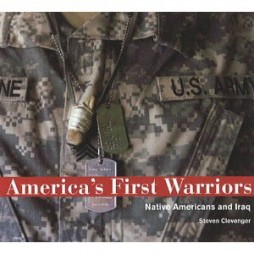 other Native men and women into war in Iraq and back home again. In addition to the photographs taken in Iraq, images of traditional coming-home ceremonies such as the War Mothers’ Dance, Welcoming Home/Cleansing Ceremony and other rituals are documented.
other Native men and women into war in Iraq and back home again. In addition to the photographs taken in Iraq, images of traditional coming-home ceremonies such as the War Mothers’ Dance, Welcoming Home/Cleansing Ceremony and other rituals are documented.
Also Thursday, Nov. 11, pianist and flautist Brad Clonch (Mississippi Choctaw) joins guitarist Jeff Carpenter (Chickasaw) in a dramatic and expressive performance of Native Music: “Injunuity” at 3:30 p.m. in the Potomac Atrium. Clonch and Carpenter won a NAMMY (Native American Music Award) in 2008 for Best Debut/Duo Group.
Learn about the Organization of American States and its work on land issues and civil rights for indigenous peoples Friday, Nov. 12, from 10 a.m. to 6 p.m., at the symposium, “Centuries of Change: State of the Native Nations,” in the Rasmuson Theater. Presented in partnership with the Organization of American States, “Centuries of Change” will examine indigenous and nation-state solutions as reflected in the Native peoples of Latin America. With the bicentennials of several Latin American countries taking place in 2010, as well as the 100th anniversary of the iconic OAS building “House of the Americas,” the symposium celebrates a year full of historical remembrance. A reception will follow in the museum’s Potomac Atrium. For more information, please contact NMAI-SSP@si.edu.
Experience award-winning violinist, flautist and storyteller Arvel Bird as he combines tales of Native American spirituality, wisdom and beauty with lively and haunting melodies on Sunday, Nov. 21 at 1 and 3 p.m. in Rasmuson Theater. Both performances will be webcast live. Bird’s message of the sacredness of Mother Earth, the environment and the animals with whom we share this planet resonate with audiences feeling overwhelmed by today’s hectic, technology-obsessed world.
On Wednesday, Nov. 17 and Thursday, Nov. 18, at 7:30 p.m. in the Rasmuson Theater, the theater troupe of the United States Naval Academy will perform “Green Grow the Lilacs,” a play by Lynn Riggs (Cherokee, 1899-1954) that was later made into the hit musical “Oklahoma!” Recognized as one of America’s most engaging dramatists, Riggs was the only American Indian writing for the Broadway stage during the first half of the 20th century.
Celebrate Thanksgiving with delicious fare from the museum’s award-winning Mitsitam Cafe by ordering from the museum’s Thanksgiving Take-Home Menu. Dishes include stuffed venison, pumpkin soup with cranberry dust, chestnut-whipped potatoes and wild mushroom bread pudding. Place your orders by Nov. 18, available for pick up Wednesday, Nov. 24 and Thursday, Nov. 25. Contact the catering office at (202) 633-7041.
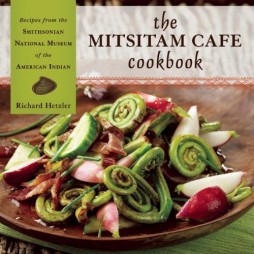 Also available from the Mitsitam Cafe is the newly released “Mitsitam Cafe Cookbook,” featuring 90 Native-inspired recipes in vivid color photography as well as an introduction to indigenous cuisine and historic images of Native food preparation and objects from the museum’s vast collection. Among the recipes are cedar-planked fire-roasted salmon, corn and chocolate tamales and fiddlehead fern salad.
Also available from the Mitsitam Cafe is the newly released “Mitsitam Cafe Cookbook,” featuring 90 Native-inspired recipes in vivid color photography as well as an introduction to indigenous cuisine and historic images of Native food preparation and objects from the museum’s vast collection. Among the recipes are cedar-planked fire-roasted salmon, corn and chocolate tamales and fiddlehead fern salad.
There will be daily storybook readings for families at 11 a.m. and 1 p.m. in the Resource Center on the third level. Listen to readings selected from the Resource Center collection and presented by museum staff and enjoy a coloring activity.
Throughout November, the Rasmuson Theater will offer screenings of the Native films, “La Fantasma de la Milpa/Phantom of Milpa” (2003, 2 min.) and “El Último Elote/The Last Ear of Corn” (2003, 2 min.) at 12:30 p.m. every day except Wednesdays. La Matatena, a Mexican non-profit that exposes youth to cinema, sponsored a clay animation workshop for 15 Triqui children who created these two short films that celebrate the importance of corn to their communities in the Sierra Alta of Oaxaca.
 Also throughout November, the Rasmuson Theater will screen “A Thousand Roads,” (2005, 40 min.) at 3:30 p.m. every day except Wednesdays. Directed by Chris Eyre (Cheyenne/Arapaho) and produced by the museum, the film threads together four stories, taking us into the life of a stressed-out Mohawk stockbroker in Manhattan; a young Inupiat girl sent to live with her grandmother in Barrow, Alaska; a Navajo gang member who must find his core values in his reservation on the mesas of New Mexico; and a Quechua healer in Peru, attempting to save a sick child.
Also throughout November, the Rasmuson Theater will screen “A Thousand Roads,” (2005, 40 min.) at 3:30 p.m. every day except Wednesdays. Directed by Chris Eyre (Cheyenne/Arapaho) and produced by the museum, the film threads together four stories, taking us into the life of a stressed-out Mohawk stockbroker in Manhattan; a young Inupiat girl sent to live with her grandmother in Barrow, Alaska; a Navajo gang member who must find his core values in his reservation on the mesas of New Mexico; and a Quechua healer in Peru, attempting to save a sick child.
A 20-minute reading program, Hok-noth-da, which means “Did you hear?” in the Shawnee language, will be held on Saturdays and Sundays at 11:30 a.m. and Fridays at 1 p.m. from Nov. 1 – Nov. 30. Designed for families and student groups (grades K-4), the program features stories about indigenous groups and a scavenger hunt among the museum’s exhibitions to find objects and artwork that relate to each tale.
All programs are subject to change. For a complete schedule of public programs, visit www.AmericanIndian.si.edu.
Posted: 5 November 2010
-
Categories:
American Indian Museum , Education, Access & Outreach , Feature Stories
